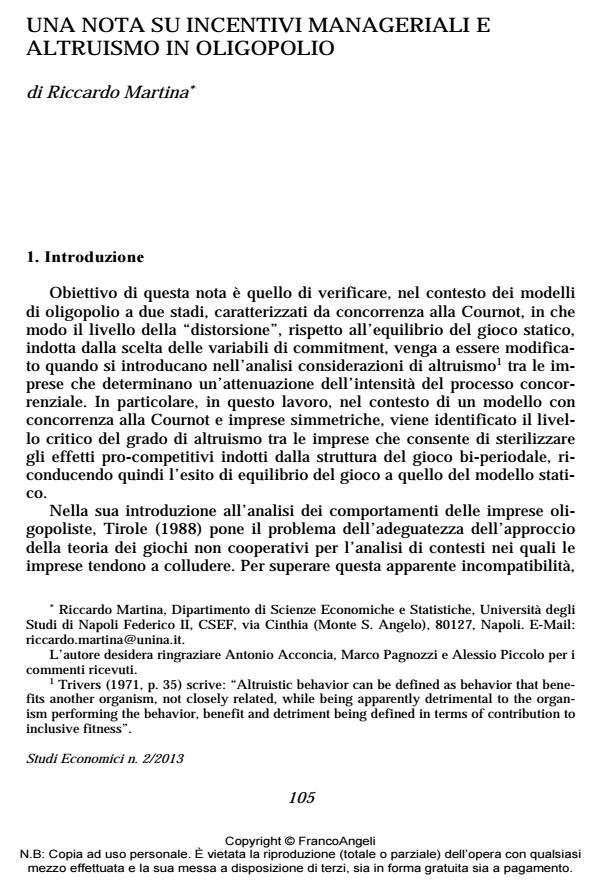Una nota su incentivi manageriali e altruismo in oligopolio
Journal title STUDI ECONOMICI
Author/s Riccardo Martina
Publishing Year 2014 Issue 2013/110
Language Italian Pages 10 P. 105-114 File size 75 KB
DOI 10.3280/STE2013-110006
DOI is like a bar code for intellectual property: to have more infomation
click here
Below, you can see the article first page
If you want to buy this article in PDF format, you can do it, following the instructions to buy download credits

FrancoAngeli is member of Publishers International Linking Association, Inc (PILA), a not-for-profit association which run the CrossRef service enabling links to and from online scholarly content.
This note explores the impact of reciprocal altruism on the equilibrium outcome of a two-stage oligopoly game with managerial frms. The structure of the classical two-stage oligopoly game with managerial incentives with strategic substitutes (quantity competition) generates a typical "distortion" at equilibrium where quantities turn out to be larger than the Cournot-Nash equilibrium ones. This paper shows that when firm owners’ objective functions are defined according to a reciprocal altruism hypothesis, the Cournot outcome of the static game can be achieved despite the two stage structure of the model. This result holds true when the analysis is extended to an N symmetric firms context.
Keywords: Oligopoly, Altruism, Incentives, Managerial Firms, Multi-Stage Games, Delegation.
Jel codes: L13, L20.
- Bagwell K., Wolinsky A. (2002), Game Theory and Industrial Organization, in Aumann
- R.J., Hart S., eds., Handbook of Game Theory with Economic Applications. Vol. 3. Amsterdam: North-Holland.
- Fershtman C., Judd K.L. (1987), Equilibrium Incentives in Oligopoly, American Economic Review, 77, 5: 927-940.
- Levine D.K. (1998), Modeling Altruism and Spitefulness in Experiments, Review of Economic Dynamics, 1, 3: 593-622.
- Sklivas S.D. (1988), The Strategic Choice of Managerial Incentives, The Rand Journal of Economics, 18, 3: 452-458.
- Tirole J. (1988), The Theory of Industrial Organization, Cambridge MA: The MIT Press
- (trad. it.: Teoria dell’organizzazione industriale, Milano: Hoepli, 1991), Trivers R.L. (1972), The Evolution of Reciprocal Altruism, Quarterly Review of Biology, 46: 35-57.
Riccardo Martina, Una nota su incentivi manageriali e altruismo in oligopolio in "STUDI ECONOMICI " 110/2013, pp 105-114, DOI: 10.3280/STE2013-110006